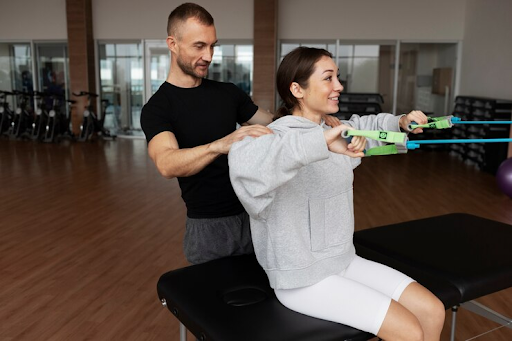Unlocking Faster Recovery and Healthier Habits: The Power of Rehabilitative Training with a Personal Trainer in Singapore
In the journey towards fitness and wellness, rehabilitative training stands out as a crucial component, especially for individuals recovering from injuries or seeking to prevent future ones. Coupled with the expertise of a personal trainer in Singapore, this specialised form of training not only promotes faster recovery but also builds sustainable, healthier habits. In this comprehensive guide, we delve into the benefits and strategies of rehabilitative training, emphasising the role of a personal trainer in Singapore, including the convenience of having a home personal trainer in Singapore for personalised guidance and support.
Understanding Rehabilitative Training
Rehabilitative training focuses on restoring functional movement patterns, improving mobility, and enhancing overall physical well-being. It is designed to address specific injuries, weaknesses, or imbalances while promoting safe and effective exercise techniques. Whether recovering from surgery, managing chronic pain, or rehabilitating from sports-related injuries, rehabilitative training plays a vital role in optimising recovery outcomes.
The Role of a Personal Trainer in Singapore
Engaging the services of a personal trainer in Singapore adds a layer of expertise and personalised attention to your fitness journey, especially in the context of rehabilitative training. A qualified personal trainer possesses the knowledge and skills to design customised workout programs tailored to your unique needs, goals, and fitness levels. They also provide continuous monitoring, feedback, and adjustments to ensure safe progression and optimal results.
Benefits of Rehabilitative Training with a Personal Trainer
Tailored Exercise Programs: A personal trainer in Singapore assesses your current fitness status, injury history, and rehabilitation goals to create a personalised exercise program. This tailored approach targets specific areas of improvement while considering any limitations or challenges you may face.
- Proper Form and Technique: Correct exercise form is crucial, especially during rehabilitative training. A personal trainer provides hands-on guidance and cues to ensure proper technique, reducing the risk of further injuries and maximising exercise effectiveness.
- Progressive Overload and Adaptation: Rehabilitative training involves progressive overload, gradually increasing intensity, volume, or resistance over time. A personal trainer monitors your progress, adjusts workouts accordingly, and introduces new challenges to promote continuous improvement without compromising safety.
- Motivation and Accountability: Consistency is key to successful rehabilitation and fitness outcomes. A personal trainer in Singapore serves as a source of motivation, accountability, and support, keeping you focused, engaged, and committed to your rehabilitation journey.
Benefits of Home Personal Training in Singapore
Opting for a home personal trainer in Singapore offers added convenience, comfort, and flexibility, especially for individuals with busy schedules or mobility limitations. Home personal training eliminates travel time to gyms, provides a private workout environment, and allows for personalised attention without distractions. Additionally, home personal trainers often bring portable equipment, making it easier to perform rehabilitative exercises in the comfort of your own space.
Strategies for Effective Rehabilitative Training
- Comprehensive Assessment: Begin with a thorough assessment conducted by your personal trainer in Singapore to identify specific areas of concern, functional limitations, and goals for rehabilitation.
- Focus on Mobility and Stability: Emphasize exercises that improve joint mobility, stability, and muscular activation in targeted areas. Incorporate dynamic stretching, mobility drills, and corrective exercises to address imbalances and weaknesses.
- Progress Gradually: Follow a progressive training plan that starts with low-intensity exercises and gradually increases intensity, volume, and complexity as you regain strength, stability, and confidence.
- Include Recovery Strategies: Prioritize rest, recovery, and recovery strategies such as foam rolling, stretching, proper hydration, and adequate sleep to support healing, reduce inflammation, and optimise recovery between training sessions.
Conclusion
Rehabilitative training with the guidance of a personal trainer in Singapore offers a holistic approach to recovery, fitness, and overall well-being. Whether recovering from injuries or aiming to prevent future ones, personalised rehabilitative programs tailored by a qualified personal trainer can accelerate recovery, improve functional movement patterns, and instil sustainable, healthier habits. Consider the benefits of home personal training in Singapore for added convenience and individualised support on your journey toward optimal health and fitness. Embrace the power of rehabilitative training and personalised guidance to unlock your full potential and achieve lasting wellness.

